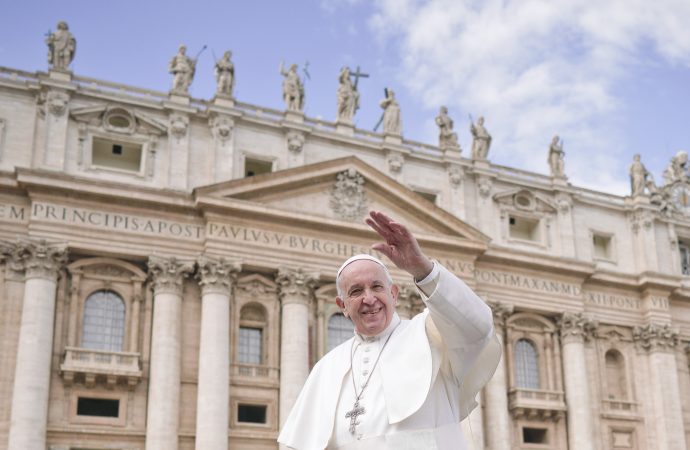Pope Francis issued three long-awaited documents on Friday setting regulations for the protection of vulnerable persons within Vatican City and the Roman Curia. They sanction mandatory reporting of sexual abuse to Vatican judicial authorities and extends the Statute of Limitation to 20 years after the victim is 18.
The goal, Francis wrote in a Motu Proprio, a type of Vatican legislative document signed by the pope, dated March 26, “is for all to be aware of the duty to report abuses to the competent authorities and cooperate with them in … prevention activities.”
The document is the first of the three “concrete initiatives” announced at the end of the February summit of bishops on the topic of clerical sexual abuse. Apart from the Motu Proprio, the Vatican will release a rulebook on best practices for bishops and create task forces in dioceses.
The Motu Proprio dictates that every abuse against minors or vulnerable persons must be legally pursued and that victims of abuse must be “welcomed, listened to and accompanied.”
Concerning the perpetrators, the document states that they be guaranteed a “fair and impartial trial” and if found guilty of abuse he must be “removed from his assignments” and offered “spiritual and psychological rehabilitation, also for the purposes of reentering society.”
“Everything must be done to rehabilitate the good name of those who have been unjustly accused,” the document reads.
Point two of the Motu Proprio requires that the Vatican curia “is obligated to present, in time, a charge to the promoter of justice of the tribunal of the Vatican City State” in they receive “news or founded motives” to believe cases of sexual abuse, except in cases which would break the seal of confession.
Point three sanctions that victims of abuse are to be offered spiritual, medical and social assistance through the accompaniment service within the Vatican’s Department of Health and Welfare.
New hires for the Roman Curia must be vetted to see if they are fit to work with children, according to Point five.
The document also asks for the creation of formation programs for the curia regarding the risks in matters concerning sexual abuse of minors or vulnerable adults and promoting best practices to “identify and prevent such offences and good practices and guidelines for their protection.”
Along with the Motu Proprio, the Vatican released legislation for the protection of minors and vulnerable adults in the Vatican City State and other Vatican entities.
The new law apples a wide-ranging definition of vulnerable adult, which includes “every person in a state of infirmity, physical or psychic deficiency, or deprived of personal freedom that in fact, and also occasionally, limits his ability to understand, decide or anyway resist the offense.”
The 12 articles that comprise the legislation bring several innovations. Article 3 states that “public officials who omits or unduly delays reporting” a case of sexual abuse, will be liable for a fine of $1000-6000. It also states that if a cleric is accused of abuse the promoter of justice must inform the Ordinary or Superior General, so they can begin canonical proceedings.
The law also extends the statute of limitation, which was limited to four years at the Vatican, to 20 years after the victim has turned 18 years old.
This legislation applies to officials, employees and members of the Roman curia, Pontifical envoys and the diplomatic corps of the Holy See, those occupying administrative roles within the Vatican City State Governorate and any other person who holds an administrative or judicial role in the Holy See “regardless of hierarchy.”
This includes about 90 percent of people working at the Vatican or Holy See. Even though there are very few children who live within the Vatican walls, many minors pass though the Vatican, since the children of employees can use the Vatican shops and medical facilites.
The guidelines for the Vicariate for Vatican City State, which provides for the pastoral care of those in the Vatican, are instead aimed at the clergy and educators in the two parishes and that exists within the Vatican walls and the people who work there. It asks that they “always be visible when in the presence of minors” and applies restrictions on the interaction between adults and minors or vulnerable adults.
These guidelines also include the mandatory reporting of abuse that is not “manifestly unfounded” and those found guilty are to be stripped of their duties, unless he is a member of clergy and therefore falling under canon law.
A March 26 editorial by editorial director of the Vatican’s Dicastery for Communications, Andrea Tornielli, pointed out several of the innovations present in the document. All cases of abuse of minors, he said, can now be reported even without a party bringing charges forward.
“Francis’s step is clear and unequivocal,” Tornielli wrote, “The protection of minors and vulnerable persons is an integral part of the evangelical message that the Church and all its members are called to spread in the word.”
The Motu Proprio will come into effect June 1, 2019.

